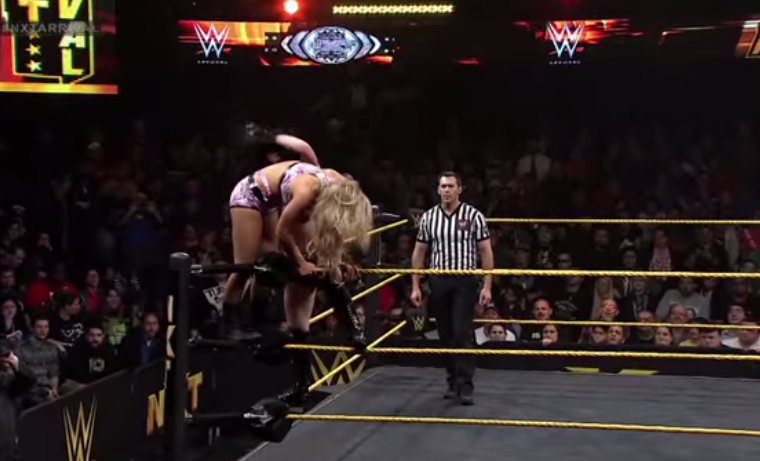It’s Okay to Cry: WWE Women Face Sexist Backlash for Crying, “Over-Celebrating” After Matches
There's plenty of crying in wrestling.

Women in the WWE have seen a lot of awesome changes of late, but, as our contributor Chris Isaac wrote back in September, “there’s years of damage to undo for the division, so it can’t all change in a few weeks or months.”
Not surprisingly, many male fans are reluctant to see women’s wrestling evolve beyond the male gaze-y, hyper-sexual matches of the past.
In a Forbes piece entitled “WWE’s Future Is Gender-Neutral And Filled With Tears,” writer Alfred Konuwa argues that “the next big step” for women in wrestling is to “have a great match without crying in the epilogue.”
To give Konuwa the benefit of the doubt, I think I understand what he was aiming for with that statement. Presumably, female wrestlers’ tears are an indication of the emotional energy required of women to succeed in an industry that sometimes sexualizes and undermines them; emotional energy that they’ll likely expend less of as women’s wrestling continues to change for the better. If parity ever becomes commonplace, it’ll also become less emotional.
But Konuwa seems to be implying that, by crying, women are directly responsible for holding their gender back:
Women crying and hugging after great matches has become an increasingly uncomfortable staple at NXT Takeover events.
The overwhelming emotion is understanding for such a milestone moment, of a women’s match main eventing the equivalent of a pay-per-view, but unfortunately it’s becoming redundant if not demeaning.
Praising a tear-free match between two women, Konuwa explains
The absence of tears following a strong women’s match will suggest that they expected nothing less than to tear the house down. It also allows fans to stay involved in the storyline, which thrives the thrill of victory and the agony of defeat. The NXT women’s division needs to get back to basics, and use the aforementioned Paige-Emma match as an example. At the end, Paige—the victor—was elated. Emma, who lost, was clearly disappointed even as Paige gave her a sportsmanlike hug. They had a great match without over-celebrating their accomplishment immediately after.
Just like the guys do.
It’s hard to imagine male wrestlers being chastised for “over-celebrating” their success, but Konuwa doesn’t trust viewers to have patience with ‘female emotion’:
If fans start getting too used to wrestlers crying after matches, the ratings will continue to disappear.
After headlining a live special, it’s logical to ask what the next big step is for women’s wrestling. A main event on Raw? A women’s-only wrestling show? A main event of WrestleMania?
The answer is none of the above. The next big step is for women to have a great match without crying in the epilogue.
[…] For fans to be interested in the type of main event that would headline WWE’s biggest pay-per-view, they need to be invested in the storyline rather than individual matches. If WWE Superstars and Divas constantly break character after these matches, it will be tough to believe the characters dislike each other and need to settle the score in a major main event.
Konuwa also took to Twitter to clarify his points:
If they wanna main event Mania they’ll stop crying. If they wanna b a token vanity project 4 civil rights, cry away https://t.co/BfJiioNSly
— Alfred (@ThisIsNasty) October 12, 2015
Then tell them to go be actors. https://t.co/DezixYnzvj
— Alfred (@ThisIsNasty) October 12, 2015
It won’t? Okay, let them keep crying for another year and see if the jaded wrestling fanbase is cool with it. https://t.co/pnapQ4tdF0
— Alfred (@ThisIsNasty) October 12, 2015
In a great take-down of the piece over on Uproxx, writer David D. points out that crying isn’t unprecedented in wrestling; in fact, it’s a time-honored part of the WWE tradition:
[…] men have cried in plenty of big matches. WrestleMania XX ended with WWE’s two champions openly sobbing into each other’s arms. Miz walked to the ring holding back tears before his WrestleMania main-event. Edge cried before his first title defense in his hometown. Ric Flair (who has cried through most of his career) and Shawn Michaels cried for the last 10 minutes of their WrestleMania match. And, again, Seth Rollins cried watching two women wrestle.
Emotional moments are part of wrestling. They’re what makes the genre great. If you see women reacting to genuinely great, captivating events and think that they’re just “being women,” then maybe you’re the problem, not them.
Konuwa’s comments actually remind me of the #DistractinglySexy hashtag from earlier this year, in which women in STEM took to Twitter to protest Nobel Prize Winner Tim Hunt’s statement that female scientists are likely to cry while working in a lab.
Although many women in the hashtag pointed out that they’d never cried at work, others argued that tears are an inevitable part of emotionally-charged labor.
For a profession like wrestling, which is both inherently emotional and inherently performative, it’s especially backwards to see women being told that the path to success is not to show emotion.
Crying isn’t a gendered act, nor should it be a career-ending one, both in the WWE and in society overall. The fact that it’s consistently perceived as such says a lot more about the fragility of masculinity than it does about women or women wrestlers.
—Please make note of The Mary Sue’s general comment policy.—
Do you follow The Mary Sue on Twitter, Facebook, Tumblr, Pinterest, & Google +?
Have a tip we should know? [email protected]